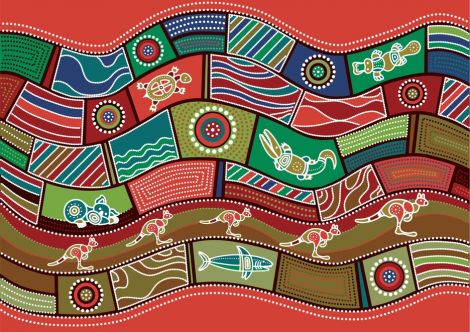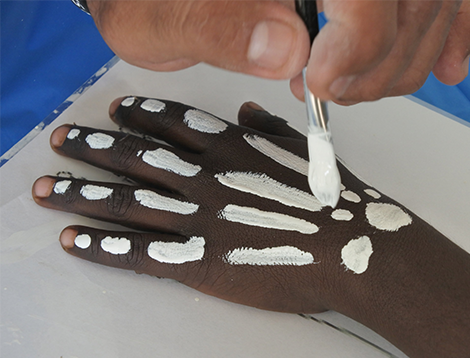Warning
Aboriginal and Torres Strait Islander viewers are advised that the following pages may contain images and voices of people who have passed on and are now deceased.
Promoting Aboriginal and Torres Strait Islander Peoples health and wellbeing
Our research programs aim to improve the social, emotional and cultural wellbeing of Aboriginal and Torres Strait Islander Peoples. Three overarching research areas encapsulate our current research strengths, addressing local and national health priorities and meeting the needs of First Peoples communities. We strive to be a leader in health research by continually improving our research performance so we can deliver benefits for Aboriginal and Torres Strait Islander peoples.
Research areas

Promoting health and wellbeing
Aboriginal and Torres Strait Islander communities have multiple and considerable strengths to promote their own health and wellbeing.
The First Peoples Health Unit conducts research in partnership with community, industry, health services, clinicians, patients and their families to maximise the benefits for Aboriginal and Torres Strait Islander peoples and contribute to effective and sustainable health service delivery.

Strengthening the health workforce
The First Peoples Health Unit employs and evaluates innovative strategies to promote the retention of Aboriginal and Torres Strait Islander tertiary students and their employability as graduates.

Building health workforce cultural capability
Researchers in the First Peoples Health Unit examine the translation of cultural capability in different settings and work with partners to develop strategies to promote cultural capability across Aboriginal and Torres Strait Islander communities.
Current research projects

Alternative tertiary entry pathways
The FPHU is actively researching alternative tertiary entry pathways for Aboriginal and Torres Strait people into health programs. It endeavours to establish a pathway to identify and capture learners who have the potential to succeed because they have endured numerous barriers that impacted on their capacity to produce the prescribed levels of academic success.

Cultural safety for health professionals
It is essential for health professionals to have an adequate cultural capability when providing healthcare for Aboriginal and Torres Strait Islander peoples. The FPHU is researching how to effectively develop cultural capability in health professionals. It is looking into the impact of implementing a Virtual Reality experience to deliver cultural learning towards developing culturally safe health professionals in Aboriginal and Torres Strait Islander healthcare.

Clinical practice within First Peoples communities
Course description: This proposed course prepares students to provide culturally safe healthcare services to Australia's First Peoples.
Prerequisites: Yuwahn Wupin and Safer Healthcare for Australia’s First Peoples.
Course introduction: Clinical practice within First Peoples communities is developed using the five cultural capabilities from the Aboriginal and Torres Strait Islander Health Curriculum Framework 2022: respect, communication, safety and quality, and critical reflection and advocacy.
Dorsi-Meter
Background: Ankle joint dorsiflexion range of motion is essential to normal gait. Ankle equinus has been implicated in a number of foot and ankle pathologies included Achilles tendonitis, plantar fasciitis, ankle injury, forefoot pain and foot ulceration. Reliable measurement of ankle joint dorsiflexion range of motion, both clinically and in a research setting, is important.
Conclusion: We found the intertester reliability of the Dorsi-Meter to demonstrate higher levels of intertester reliability compared to previous studies investigating other devices. We reported the MDC values to provide an estimate of the smallest amount of change in the ankle joint dorsiflexion range of motion that must be achieved to reflect a true change, outside the error of the test. The Dorsi-Meter has been established as an appropriate reliable device to measure ankle joint dorsiflexion for clinicians and researchers with very small minimal detectable change and limits of agreement.
A roadmap for Aboriginal and Torres Strait Islander adolescent health
The FPHU is working with the South Australian Health and Medical Research Institute on a roadmap for Aboriginal and Torres Strait Islander adolescent health. It’s called A roadmap for Aboriginal and Torres Strait Islander adolescent health: Defining priority health needs and actions through empowerment and capacity development of young people.
Background and rationale: A third of the Aboriginal and Torres Strait Islander (Indigenous) population are adolescents (aged 10 to 24 years). Adolescence is the time when disparities in mortality widen between Indigenous and other Australians. Earlier work has established the substantial and unmet health needs of these young people; 80 per cent of excess mortality among Indigenous adolescents is potentially avoidable within the current health system—a substantial opportunity for health gain. As yet, there is no Australian national strategy for Indigenous adolescent health. A comprehensive roadmap is needed to identify health needs and develop evidence-based solutions that address the broader determinants of Indigenous Australian adolescent health. Effective responses will have three key impacts: improved health and wellbeing of young people, healthier future adults (given many health risks for future chronic disease arise and are modifiable during adolescence), and a healthier next generation (by improving health outcomes for future parents).
Current evaluations and reviews
Publications
Acknowledgment of Country
The First Peoples Health Unit acknowledges the wisdom inherent in the Traditional Custodians of Australia as the oldest surviving culture in the world. We recognise their custodianship of the land on which all Griffith University campuses are located. We recognise the connection to their land, air, sea and community. We would like to pay our respect to their Elders and Leaders that are past, present, and future. We extend that respect to all Aboriginal and Torres Strait Islander peoples.
Contact us
Phone: 07 567 80508
Email: fphu@griffith.edu.au
Office: Room 3.16 Academic 1 (G01) Gold Coast campus Griffith University